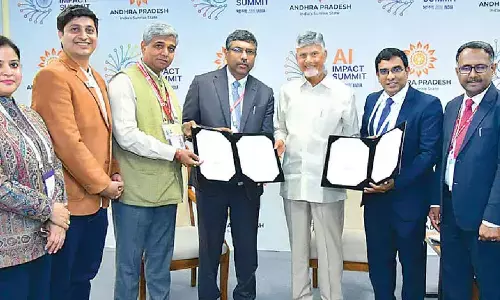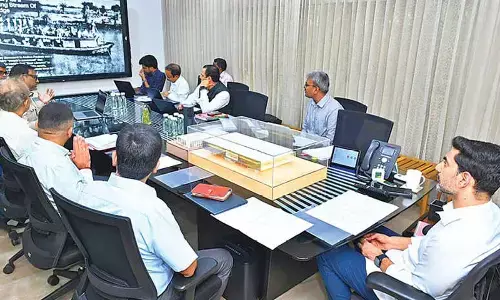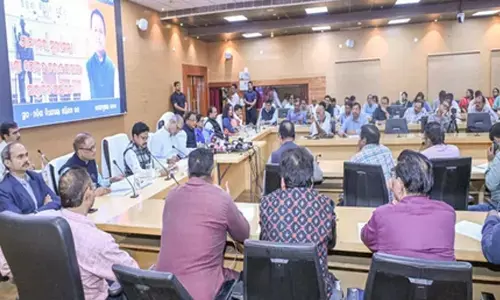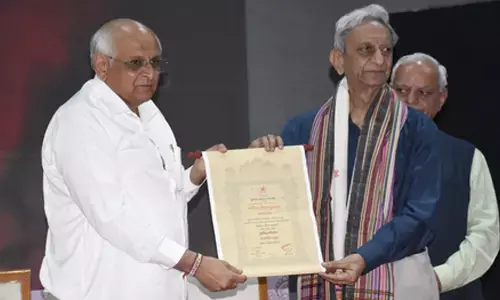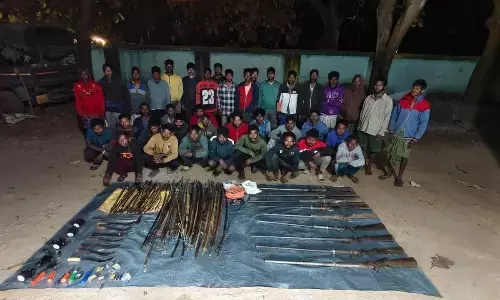Granules India focusing on sustainability
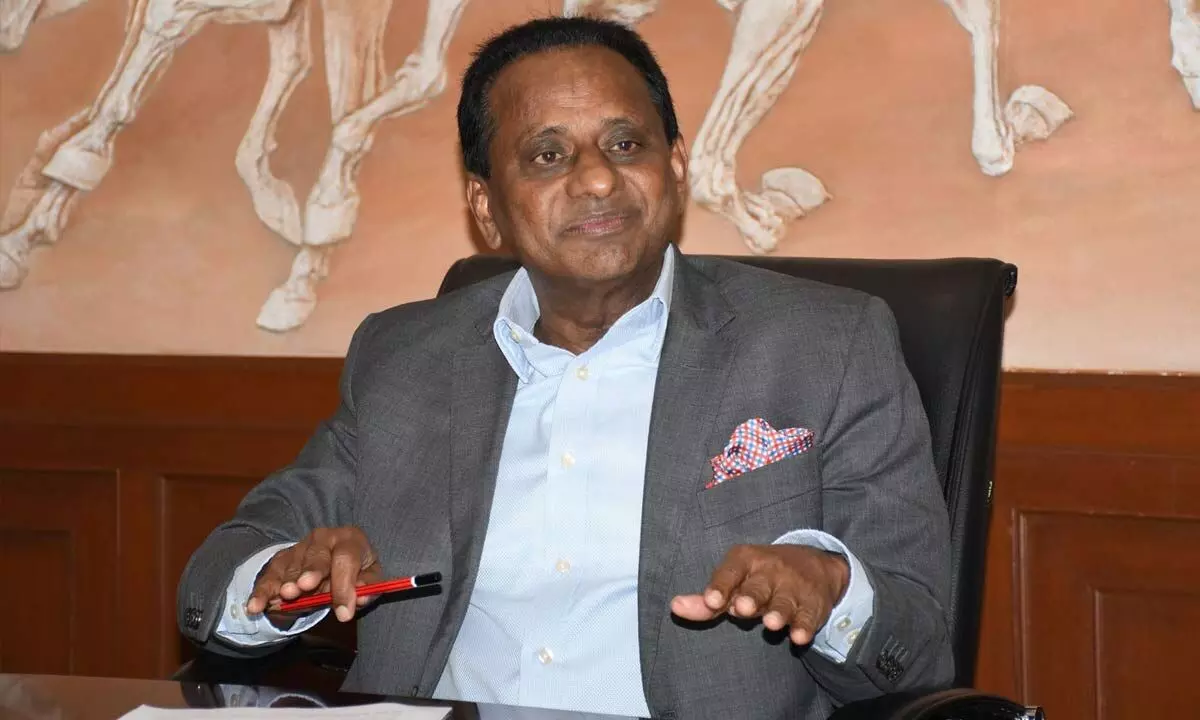
Dr Krishna Prasad Chigurupati Photo: G Ramesh
The Hyderabad-headquartered pharma company’s actual CSR spending remained higher than the estimated budgets for the last 3 financial years
Hyderabad: Granules India Limited is a 32-year-old vertically integrated pharmaceutical company headquartered at Hyderabad with best-in-class facilities and commitment to operational excellence, quality, and customer service. It is one among the few global pharma firms to be present in the manufacturing of the entire value chain. Its products are being distributed to over 300 customers in regulated and semi-regulated markets with a global presence extending to 80+ countries. It has six manufacturing facilities in India and one in the US. In an exclusive interview, its Dr Krishna Prasad Chigurupati, CMD of Granules India Limited tells The Hans India about their philanthropic activities and plans ahead.
Who is your ideal philanthropist and why?
My father Dr ChigurupatiNageswar Rao is my role model in philanthropy. He was a pre-eminent medical physician in Andhra Pradesh who completed his education and training in the UK. During his 50-years of service to the community, he provided medical attention to many people throughout the country including citizens who could not avail proper healthcare.
When did your philanthropic journey start and how?
I grew up watching my father treating the underprivileged individuals without taking any payment. He did a lot of service to the poor. He was selfless and his only job was to make medical care affordable to the people. It's stuck in my mind that you have to do something in whichever way and make an impact on society.
I started getting into philanthropy, but not like him. Whether he made money or not, he used to be too liberal. I thought about how to help people out, once we had grown our business. I believe in teaching a man how to fish, rather than giving away. So, we passionately took up skill development initiatives.
To address the skill deficit existing in the country, Granules India in partnership with Swarna Bharat Trust started Pharma Patashala in 2017. Students aged 18-21 years and passed their Intermediate (MPC/BiPC) with 55 per cent marks can apply for the courses as per the curriculum prescribed by Life Science Sector Skill Development Council (LSSSDC).
Could you tell us more about Pharma Pathasala and how it is helping the rural youth?
Pharma Pathasala is a Pharma Skills Development Division in the premises of Swarna Bharat Trust, Muchintal in Hyderabad. The state-of-the-art facility has working models of all types of equipment used in manufacturing of active pharmaceutical ingredients (APIs) to finished dosages. Rural students of Telugu States attend the two-month residential course free of cost.
Granules India bears the cost of the skill building programme at Rs 25,000 per student for both training and stay. Moreover, the students are paid a stipend of Rs 5,000 each month. Once the training is completed, the company absorbs them as entry level shop-floor executives at an annual CTC of Rs 1.26 lakh.
Since commencement of Pharma Patashala, over 1,000 students have benefited from this programme including 146 girl students during the last five years. Out of them, 240 students opted for B Voc. One or two batches completed the programme so far. The company has spent more than Rs 7 crore on the programme, which is now in the fifth year of existence. For this programme, the company has won the prestigious TISS LeapVault CLO Awards 2022 under the Best Skill Development Initiative.
In which thematic areas have you spent the CSR funds so far? What are the new elements you are focusing on in the near future?
Till now, our focus was mainly on skill development as well as healthcare sectors. We also concentrate on performing responsible business based on the UN Sustainable Development Goals and our National Guidelines on Responsible Business Conduct. We aspire to be among the most sustainable companies by adopting the best-in-class practices. Our Environmental, Social & Governance (ESG) journey commenced last year with a context setting workshop on sustainability for the leadership team, followed by a series of capability building workshops for various cross functional teams. For the next three years, we have targeted to reduce carbon emission, and water & waste footprint at our facilities. The company has recently partnered with Greenko ZeroC for green molecule solutions and its wider applications in pharmaceuticals to build a leadership position in sustainability and circular economy initiatives and to be a pioneer in the industry. Both firms will develop and promote state-of-the-art Integrated Green Pharmaceutical Zones (GPZ) in Kakinada, AP.
Granules will build a green field facility based on sustainability principles for large-scale manufacturing of key starting materials (KSMs), intermediates, APIs and fermentation-based products. The facility spread across 100 acres, will be commissioned in a phase wise manner. The estimated cost of the project will be Rs 2,000 crore over five years. This partnership will power our sustainability journey by minimising carbon footprint and impact of our operations on the environment. Sustainability and green chemistry are key pillars of our commitment to heal the planet and people through minimising carbon footprint, adopting resource efficient processes, and reducing waste across our value chain.
Could you reveal the CSR Budgets for the last three financial years?
Our spending for the corporate social responsibility (CSR) always remains more than what we estimate. We have dedicated Rs 911.59 lakh towards CSR activities in FY 2021-22. However, we spent Rs 912.98 lakh during the previous financial year. The amount includes Rs 128 lakh spent on administering Covid vaccine doses to over 4,500 employees.
Similarly, the company had planned to spend Rs 561.77 lakh and Rs 437.51 lakh on the CSR initiatives during FY 2020-21 and FY 2019-20 respectively, but the actual spending crossed to Rs 561.79 lakh and Rs 437.75 lakh in the corresponding two fiscals.




